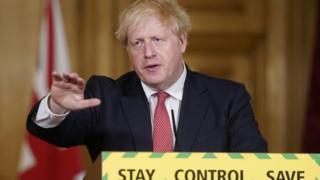Coronavirus: Boris Johnson sets out plan for ‘significant normality’ by Christmas

Image copyright
PA Media
Coronavirus restrictions will ease further in England under plans for a “significant return to normality” by Christmas, Boris Johnson has announced.
Under the new guidelines, people may use public transport for journeys immediately, while advice for employers will change from 1 August.
Companies will have more discretion to bring staff back to workplaces if it is safe to do so, the PM explained.
Mr Johnson added he was “hoping for the best and planning for the worst”.
At a news conference at Downing Street, the PM said the roadmap “remains conditional” on the UK pulling together to win its “long fight” against Covid-19.
“It is my strong and sincere hope that we will be able to review the outstanding restrictions and allow a more significant return to normality from November at the earliest – possibly in time for Christmas,” he said.
Devolved administrations in Scotland, Wales and Northern Ireland have the power to set their own timings for the easing of restrictions.
In the announcement, Mr Johnson said that the government was making it clear to people in England they may use public transport now.
From 1 August, he said: “Instead of government telling people to work from home, we are going to give employers more discretion, and ask them to make decisions about how their staff can work safely.”
He explained that could mean “continuing to work from home, which is one way of working safely and which has worked for many employers and employees”.
The government’s current social distancing guidance requires people to stay at least 1m apart with certain precautions.
On Thursday, the government’s chief scientific adviser, Sir Patrick Vallance, told MPs there was “absolutely no reason” to change the government’s current guidance on working from home.
The government has advised people to “work from home if you can” since March, and Sir Patrick said home working was still a “perfectly good option” for many.
The PM said during the news conference that he “totally agrees” with Sir Patrick and that it was not for the government to tell employers where their workforce should be.
Labour leader Sir Keir Starmer said he will look at the details of the government’s plan to get people back to work but stressed “this can’t be done on a wing on a prayer and requires a credible plan and national leadership”.
Also from 1 August, Mr Johnson said most remaining leisure settings, such as bowling alleys, skating rinks and casinos, and close-contact services such as beauticians could resume.
Indoor performances with socially-distanced audiences in theatres, music and performance venues will also be allowed from next month.
However, soft play areas and nightclubs will remain closed beyond that date, although they “will be kept under review.”
From October, he said fans could be able to return to sport stadiums. if pilot events go well.
The upcoming World Snooker Championships in Sheffield, the Glorious Goodwood horse racing festival and two men’s county cricket friendly matches are set to be among the trial sporting fixtures.
At-a-glance: The latest changes in England
- From 25 July indoor gyms, pools and other sports facilities can reopen
- On 1 August the government will update its advice on going to work, asking employers to make decisions about how and where their staff can work safely
- From the same date, most remaining leisure settings, including bowling, skating rinks, casinos and all close contact services such as beauticians, will be allowed to reopen
- Live indoor theatre and concerts will be able to resume with socially distanced audiences
- Wedding receptions for up to 30 people will also be allowed from next month
- From September, schools, nurseries and colleges will be open for all children and young people on a full-time basis, while universities are also working to reopen as fully as possible
- From October, the government intends to allow audiences to return to stadiums, while conferences and other business events can recommence, subject to the outcome of pilots
The PM indicated that social distancing measures could be relaxed further for loved ones.
He said: “Throughout this period, we will look to allow more close contact between friends and family, where we can.”
Second wave
Mr Johnson also confirmed an additional £3bn in funding for the NHS to help it prepare for a potential second wave of infections and to cope with its usual winter pressures.
An expansion in testing capacity to a target of 500,000 tests a day by the end of October would help identify positive coronavirus cases among people with symptoms of seasonal illnesses, he added.
In addition to the further easing of lockdown restrictions in England, Mr Johnson unveiled new powers for local authorities to manage outbreaks of the virus in their areas.
He said local authorities would have the power to close premises, close off public outdoors spaces and cancel events.
Ministers would also receive clearer guidance on where they can intervene to “close whole sectors or types of premises in an area” and advise people in specific postcodes to stay at home.
“It has to be right that we take local action in response to local outbreaks – there is no point shutting down a city in one part of the country to contain an outbreak in another part of the country,” Mr Johnson said.
- YOU, ME AND THE BIG C: Cancer treatment during the pandemic
- GROUNDED WITH LOUIS THEROUX: The ten most surprising moments from the lockdown podcast
Do you have any work related issues? Is it safe for you to return to the workplace? Is working from home working for you? Email .
Please include a contact number if you are willing to speak to a BBC journalist.
- WhatsApp: +44 7756 165803
- Tweet: @BBC_HaveYourSay
- Please read our terms & conditions and privacy policy

